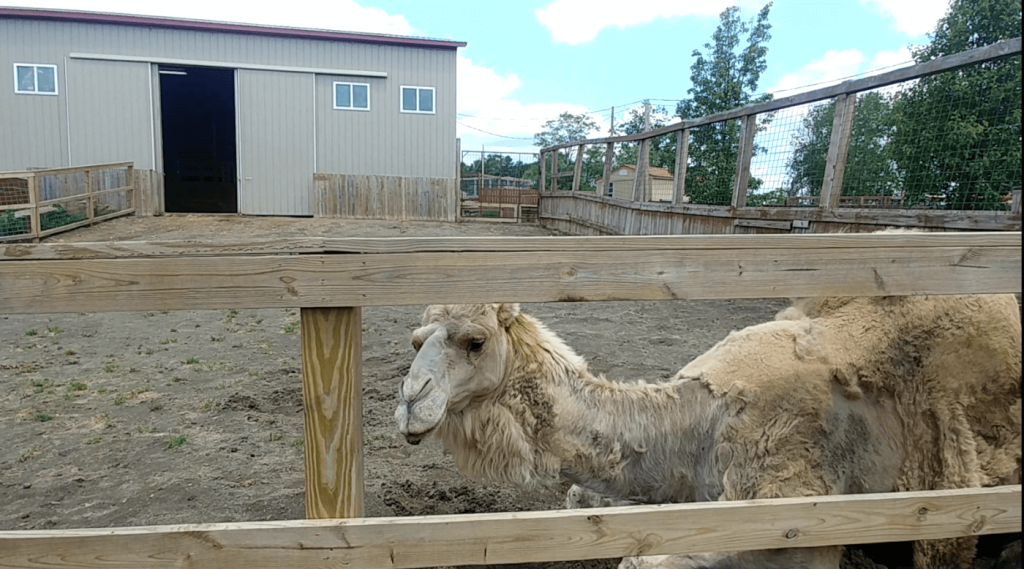A wide variety of ungulates—hoofed animals, who are mostly herbivorous—suffer at shoddy roadside zoos across the U.S. They’re imprisoned at facilities with histories of troubling animal welfare issues that often go overlooked. Addressing and ending the cruelty that ungulates and other animals face at roadside zoos is crucial. The speciesist practice of using animals for entertainment must be relegated to the history books, as living, feeling individuals should never be exploited.
Hoofed Animals Used at Roadside Zoos
Many species of ungulates are exploited at roadside zoos, including giraffes, goats, deer, elk, llamas, alpacas, bison, cows, antelopes, sheep, camels, pigs and peccaries, donkeys, zebras, ponies, and horses.
Many hoofed animals, such as cows, warthogs, pigs, sheep, and antelopes, are ruminants, which means they have a complex multi-stomached digestive system that efficiently digests plant material. These animals chew their cud.
Hoofed animals are usually grazers (eating low-growing plants such as grass) or browsers (eating woody twigs and the leaves of trees and bushes) who forage continuously throughout the day in their natural habitats. Pigs are omnivores.
Ungulates are easy for roadside zoo owners to obtain, less dangerous to handle than large carnivores, and cheaper to feed than carnivores. As a result, they are often kept in large herds and used in interactions with members of the public, including at petting zoos.
PETA receives footage on a weekly basis of ungulates at roadside zoos who appear to be neglected, injured, or ill. Perhaps because there are so many of them, roadside zoo owners tend to overlook their individual welfare.
How Hoofed Animals Suffer at Roadside Zoos
Common welfare concerns that cause ungulates to suffer at roadside zoos include the following:
Confinement to small, barren enclosures with flat dirt or pebble surfacing, lacking even a blade of grass or a tree to eat, let alone any toys or other enrichment: The lack of vegetation can frustrate ungulates’ natural desire to graze or browse, leading to bar-biting and repetitive chewing behavior. The desolate environment and cramped space can lead to other repetitive behavior indicative of psychological distress, such as pacing or circling.
Inappropriate diets and food amounts, which lead to weight problems: Many roadside zoos offer food, such as bread and cereals (including corn), for visitors to feed to ungulates. These “snacks” are often unhealthy and inappropriate for their stomachs, and it’s unclear at many roadside zoos whether they’re also receiving species-appropriate diets in addition to the snacks. A diet high in carbohydrates and sugar can cause gastrointestinal problems, laminitis (a painful condition affecting the hooves), bloat, and even death if fed consistently to ruminants. Exhibitors regulated by the U.S. Department of Agriculture are required to have an employee present to monitor any feeding of animals by the public to ensure that everyone is safe and the animals are not being fed anything dangerous, but roadside zoos are routinely cited for allowing unattended feeding in violation of the federal Animal Welfare Act. This means there’s no regulation of how much or how little each animal is eating and no way to be sure that each individual’s dietary needs are being met in mixed-species enclosures. These issues lead to serious weight problems, primarily thinness but sometimes obesity. Both have severe consequences for the animals’ health.
Overgrown, chipped, and/or cracked hooves: Ungulate hooves and nails need regular trimming and cleaning by a professional to maintain their shape and health. Overgrown hooves and nails can lead to lameness and tendon damage and contribute to arthritis—and cracks and chips can cause painful abscesses and infections. Long hooves start to curl and make walking extremely difficult. Neglected hooves and nails are one of the most common welfare issues PETA observes at roadside zoos.
Accumulations of feces that are rarely removed: Hoofed animals produce a lot of feces, creating a sanitation problem that can attract flies and transmit diseases. Many roadside zoos let the feces pile up in ungulate enclosures.
Inappropriate social groups, severe crowding, or animals housed alone: Ungulates are generally herd animals, so they should live with others of their own species in groups of appropriate size. Donkeys, for example, usually prefer to be in pairs rather than large groups, while sheep prefer large groups over pairs. Ungulates kept alone are likely lonely and find the isolation stressful. Conversely, roadside zoos often crowd large groups of hoofed animals into small enclosures, which can cause some of them not to receive enough food or veterinary care. This also fosters disease and parasite transmission throughout the herd, which, as PETA often sees, can cause multiple animals to suffer from hair loss or diarrhea.
Lack of sightlines and housing them next to predators: Ungulates are prey animals, and they flock together to protect themselves from predators, whom they can spot with their good eyesight and wide field of vision. So it’s important for them to have clear sightlines all around, or they may feel stressed. Unfortunately, many roadside zoos confine ungulates to high-walled enclosures where they can’t see around them, which is likely distressing for them. Similarly, housing captive predators and prey animals next to each other is stressful for both species because the predators can’t access the prey and the prey animals can’t flee the predators.
Take Action for Ungulates
No animal—ungulate or otherwise—should ever be used for entertainment or subjected to suffering, including at roadside zoos. You can help spare them by taking action today:
The post Uncovering Cruel Conditions for Hoofed Animals at Roadside Zoos appeared first on PETA.

